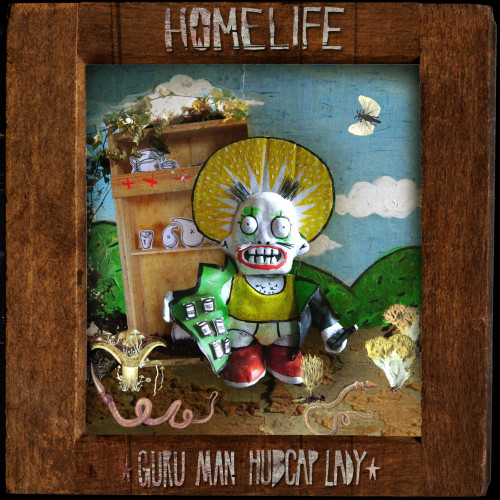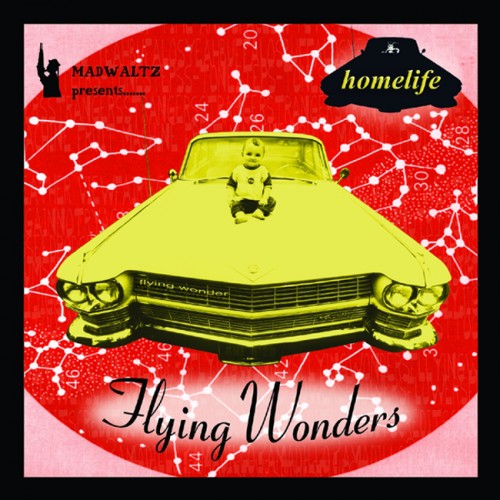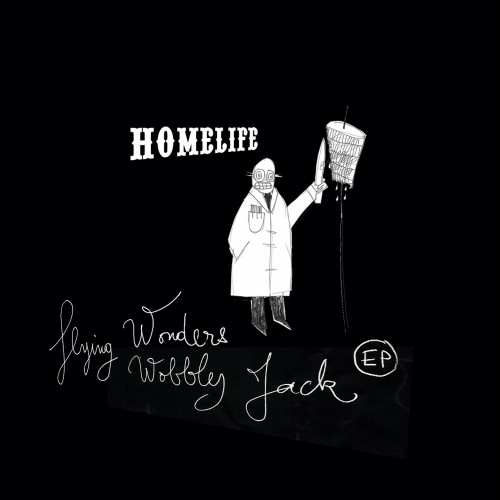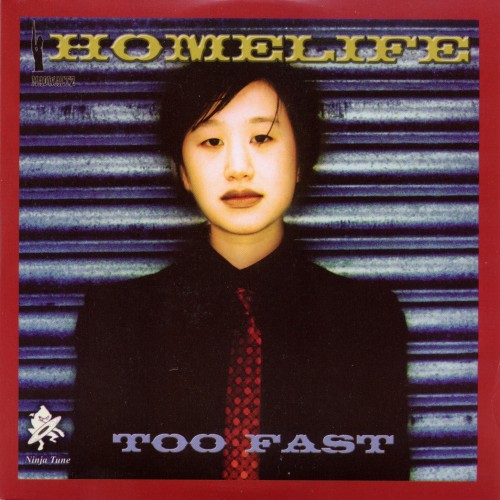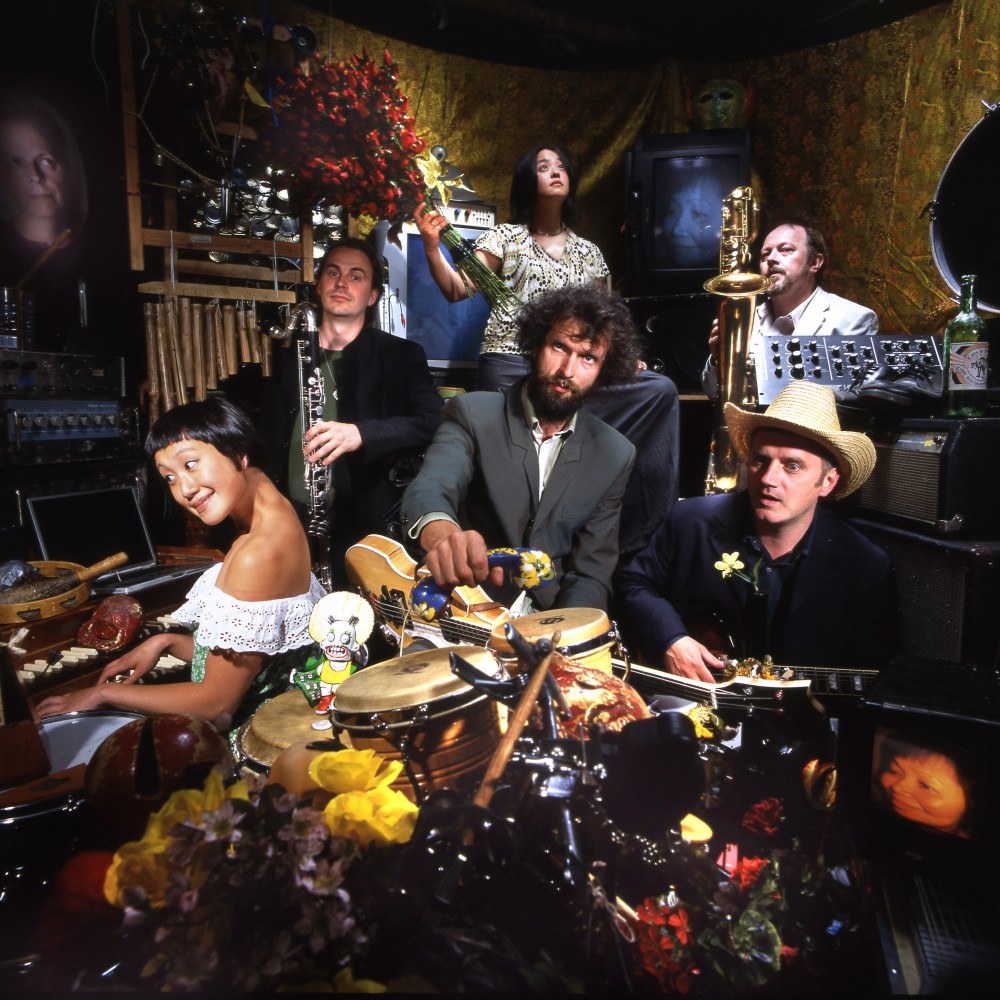
Homelife
On Ninja Tune
BIOGRAPHY
HOMELIFE BIOGRAPHY Homelife is not a definite entity. It's hard to pin down their sound, how many people are in the band or even which band they are in! Nearly every Homelife track has a different line up. Less of a collective, Homelife is more of a pool of musicians whose talents are marshalled by reluctant foreman Paddy Steer. There's a do-it-yourself ethos evident in Homelife. All material is recorded at Paddy's house with musicians doing their bit in small groups....
HOMELIFE BIOGRAPHY Homelife is not a definite entity. It's hard to pin down their sound, how many people are in the band or even which band they are in! Nearly every Homelife track has a different line up. Less of a collective, Homelife is more of a pool of musicians whose talents are marshalled by reluctant foreman Paddy Steer. There's a do-it-yourself ethos evident in Homelife. All material is recorded at Paddy's house with musicians doing their bit in small groups. With 15 to 16 contributor's on the most recent album, 'Cho Cho' the piecemeal approach makes sense and Paddy admits that it wouldn't be possible for the whole band to be in the studio at the same time. "It's not like the Monkees where we all in the room together. Ten years ago Homelife wouldn't have been practical but advances in technology have made a project like this possible," he states. Whilst the majority of the co-operative are Manchester based, male vocalist Faron Brooks lives on Vancouver Island, Canada and key member Simon King is based in London. Technology again lowers the height of these creative hurdles with Paddy even seeing positive aspects to Faron's displacement. "It means we get more editorial control over his vocals," he deadpans before likening the arrangement to that Portishead have with their vocalist. Homelife revolves around the nucleus of the band is Paddy Steer (bass), Tony Burnside and Simon King (both guitar). They write and produce most of the songs although Paddy is quick to point out that other individuals contribute in an organic composition process. Percussion is provided by combinations of Icarus Wilson Wright, Richard Harrison, James Ford and Jason Self. In the string section, Rosie Lowdell plays violin and Semay Wu the cello; Seaming To occupying the role chanteuse. Seaming shares her given name - the Chinese for 'sea' - with Semay but chooses a different spelling. Male vocals are supplied by Faron Brooks. As with all things Homelife, it isn't as simple as that. Most of the band are multi-instrumental and there's a corresponding level of promiscuity. Half the band play in the related Toolshed project, fronted by 808 State's Graham Massey, and he returns the favour by contributing clarinet and saxophone. Paddy cites punk as his entry in music. The first band he saw live were The Clash but was too young to get into see the Dead Kennedy's. He went to school with Faron, who began his musical career by penning the theme tune to kid's TV programme 'Why Don't You'. The pair formed a band playing Beatles and Elvis covers. Faron's family emigrated to Canada. In 1985 Paddy joined Yargo where he met Tony Burnside. He describes their music as 'sparse, dubby, funky'. A deal with London resulted in three albums 'Bodybeat', 'Communicate' and the live album 'Prickly But Sweet'. Despite success and some renowned concerts in France, the band broke up in 1990. When asked what Yargo taught him Paddy replies "Pay your tax before you're skint." At the same time as Yargo, Paddy was involved in Graham Massey's first band, Biting Tongues, on a part-time basis He bowed out at the same time as Yargo dissolved. He went on to session for 'obscure French artists' and subsequently to score films with Simon King ( a fan of Morricone and John Barry as well as punk) for student shorts at the London College Of Printing. In total Paddy has thirteen soundtracks. Justin Robertson, who remixed a Yargo track but never met the band at the time, asked Paddy to join Lionrock in 1996 after the first album. It's an on-going open ended, if dormant, arrangemnt. With a backlog of ideas Paddy, Tony and Simon formed Homelife in 1997. A suprise reunion with Faron followed: "I came home one day three years ago and did 1471 and it was him. His family had moved back. With a voice like his I would have thought that he would have made some records but he hadn't. I thought we'd better do something about it and asked him to sing for us." The first album, eponymously titled 'Homelife' was released on their own Homelife imprint without any major label promotion. The wilfully low key strategy elicited a correspndingly low key response that doesn't do the record justice. The 1999 follow up, 'Cho Cho' was funded Paddy's grandmother's inheritance and tracked the same groove. Clued up music lovers kept Homelife's loose melodies to themselves. Despite Paddy's best efforts to avoid detection, record labels began to sniff around; not least because of an accomplished live appearance at Manchester's Band On The Wall. Trying to concentrate on the music without having to keep one eye on A&R considerations Homelife value the musical freedom that doing it themselves affords. There's a certain looseness that Homelife offers.The rest will sort itself out.
Homelife
On Ninja Tune
Latest News
BIOGRAPHY
HOMELIFE BIOGRAPHY Homelife is not a definite entity. It's hard to pin down their sound, how many people are in the band or even which band they are in! Nearly every Homelife track has a different line up. Less of a collective, Homelife is more of a pool of musicians whose talents are marshalled by reluctant foreman Paddy Steer. There's a do-it-yourself ethos evident in Homelife. All material is recorded at Paddy's house with musicians doing their bit in small groups. With 15 to 16 contr...
HOMELIFE BIOGRAPHY Homelife is not a definite entity. It's hard to pin down their sound, how many people are in the band or even which band they are in! Nearly every Homelife track has a different line up. Less of a collective, Homelife is more of a pool of musicians whose talents are marshalled by reluctant foreman Paddy Steer. There's a do-it-yourself ethos evident in Homelife. All material is recorded at Paddy's house with musicians doing their bit in small groups. With 15 to 16 contributor's on the most recent album, 'Cho Cho' the piecemeal approach makes sense and Paddy admits that it wouldn't be possible for the whole band to be in the studio at the same time. "It's not like the Monkees where we all in the room together. Ten years ago Homelife wouldn't have been practical but advances in technology have made a project like this possible," he states. Whilst the majority of the co-operative are Manchester based, male vocalist Faron Brooks lives on Vancouver Island, Canada and key member Simon King is based in London. Technology again lowers the height of these creative hurdles with Paddy even seeing positive aspects to Faron's displacement. "It means we get more editorial control over his vocals," he deadpans before likening the arrangement to that Portishead have with their vocalist. Homelife revolves around the nucleus of the band is Paddy Steer (bass), Tony Burnside and Simon King (both guitar). They write and produce most of the songs although Paddy is quick to point out that other individuals contribute in an organic composition process. Percussion is provided by combinations of Icarus Wilson Wright, Richard Harrison, James Ford and Jason Self. In the string section, Rosie Lowdell plays violin and Semay Wu the cello; Seaming To occupying the role chanteuse. Seaming shares her given name - the Chinese for 'sea' - with Semay but chooses a different spelling. Male vocals are supplied by Faron Brooks. As with all things Homelife, it isn't as simple as that. Most of the band are multi-instrumental and there's a corresponding level of promiscuity. Half the band play in the related Toolshed project, fronted by 808 State's Graham Massey, and he returns the favour by contributing clarinet and saxophone. Paddy cites punk as his entry in music. The first band he saw live were The Clash but was too young to get into see the Dead Kennedy's. He went to school with Faron, who began his musical career by penning the theme tune to kid's TV programme 'Why Don't You'. The pair formed a band playing Beatles and Elvis covers. Faron's family emigrated to Canada. In 1985 Paddy joined Yargo where he met Tony Burnside. He describes their music as 'sparse, dubby, funky'. A deal with London resulted in three albums 'Bodybeat', 'Communicate' and the live album 'Prickly But Sweet'. Despite success and some renowned concerts in France, the band broke up in 1990. When asked what Yargo taught him Paddy replies "Pay your tax before you're skint." At the same time as Yargo, Paddy was involved in Graham Massey's first band, Biting Tongues, on a part-time basis He bowed out at the same time as Yargo dissolved. He went on to session for 'obscure French artists' and subsequently to score films with Simon King ( a fan of Morricone and John Barry as well as punk) for student shorts at the London College Of Printing. In total Paddy has thirteen soundtracks. Justin Robertson, who remixed a Yargo track but never met the band at the time, asked Paddy to join Lionrock in 1996 after the first album. It's an on-going open ended, if dormant, arrangemnt. With a backlog of ideas Paddy, Tony and Simon formed Homelife in 1997. A suprise reunion with Faron followed: "I came home one day three years ago and did 1471 and it was him. His family had moved back. With a voice like his I would have thought that he would have made some records but he hadn't. I thought we'd better do something about it and asked him to sing for us." The first album, eponymously titled 'Homelife' was released on their own Homelife imprint without any major label promotion. The wilfully low key strategy elicited a correspndingly low key response that doesn't do the record justice. The 1999 follow up, 'Cho Cho' was funded Paddy's grandmother's inheritance and tracked the same groove. Clued up music lovers kept Homelife's loose melodies to themselves. Despite Paddy's best efforts to avoid detection, record labels began to sniff around; not least because of an accomplished live appearance at Manchester's Band On The Wall. Trying to concentrate on the music without having to keep one eye on A&R considerations Homelife value the musical freedom that doing it themselves affords. There's a certain looseness that Homelife offers.The rest will sort itself out.

